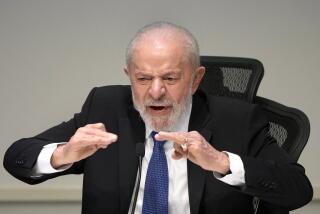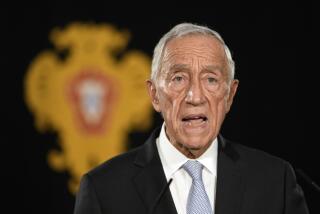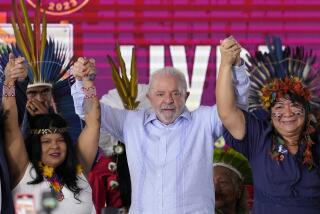Castro Criticizes U.S. Elections, Invasions
- Share via
BRASILIA, Brazil — Cuban President Fidel Castro, in Brazil for the inauguration of a popularly elected president, criticized the U.S. electoral system Friday and suggested that it is less democratic than Cuba’s.
In power since the triumph of his revolution in 1959, Castro has never called direct presidential elections. Asked in a press conference here whether he could win free elections, he asked, “What is understood by ‘free elections’?”
Turning to the United States as an example, he observed that some candidates have “enormous quantities of resources.”
“For (elections) to be free, one would have to ask if everyone has equal conditions, equal resources,” he said.
Castro explained that in the Cuban electoral system, the people vote every 2 1/2 years for neighborhood delegates. He denied that the elections are influenced by the Communist Party, Cuba’s only legal party.
Castro said that about 97% of eligible Cuban voters cast ballots, while only 48% of Americans do, electing a president with 25%. “What a big comedy, a gigantic comedy,” he said.
Asked to comment on the U.S. invasion of Panama, he said it was an arrogant “massacre of Latin Americans,” used by the United States to test new weapons, such as radar-evading aircraft.
Americans applauded the “great victories” in invasions of Grenada and Panama, Castro said, but he warned that any invasion of Cuba would have consequences for the United States comparable to those of the Vietnam War.
“If something impedes a threat of aggression against our country, it is that they know it would cost them an unpayable price,” he said. “When the bodies start going back in boxes, the applause stops.”
Castro said his trip to Brazil for President Fernando Collor de Mello’s inauguration has been useful for promoting Latin American unity against U.S. imperialism, and he indicated that Cuba may look more toward Latin America than to Eastern Europe in the future.
As a result of Eastern Europe’s shift to non-Communist political ideas and free-market economic policies, support there for Castro’s staunchly Marxist-Leninist government has waned.
“If the problems in Eastern Europe continue to grow worse, if they adopt anti-Cuban positions, if they adopt positions of trying to blockade Cuba . . . we are delighted to develop our trade with Latin American countries,” Castro said.
In Havana, meanwhile, Castro’s brother, Raul, read a statement from the Communist Party leadership announcing the party’s fourth congress will be held during the first half of 1991. The statement also urged the party to shed bureaucracy and dogmatism, accept different points of view, and improve the government and the operation of the socialist economy.
The leadership reaffirmed its commitment to a single-party, Marxist-Leninist system and vowed to resist any outside pressure to change.
“Counterrevolutionary and anti-social elements . . . should be warned that acting at this time as the puppets of imperialism will mean them becoming the biggest traitors Cuba has ever had and that is how the law and the people will treat them,” the statement said.
More to Read
Sign up for Essential California
The most important California stories and recommendations in your inbox every morning.
You may occasionally receive promotional content from the Los Angeles Times.













